-
Plant Name & Description
Botantical Name
-

Early Hybrids Red-Hot Poker Kniphofia uvaria 'Early Hybrids'
Upright growing perennial. Narrow grass-like leaves grow basally. Flowers are in shades of red and orange turning to yellow at the base. Very drought and heat tolerant. Deadheading will prolong bloom time. Plant in well-drained soils.
-
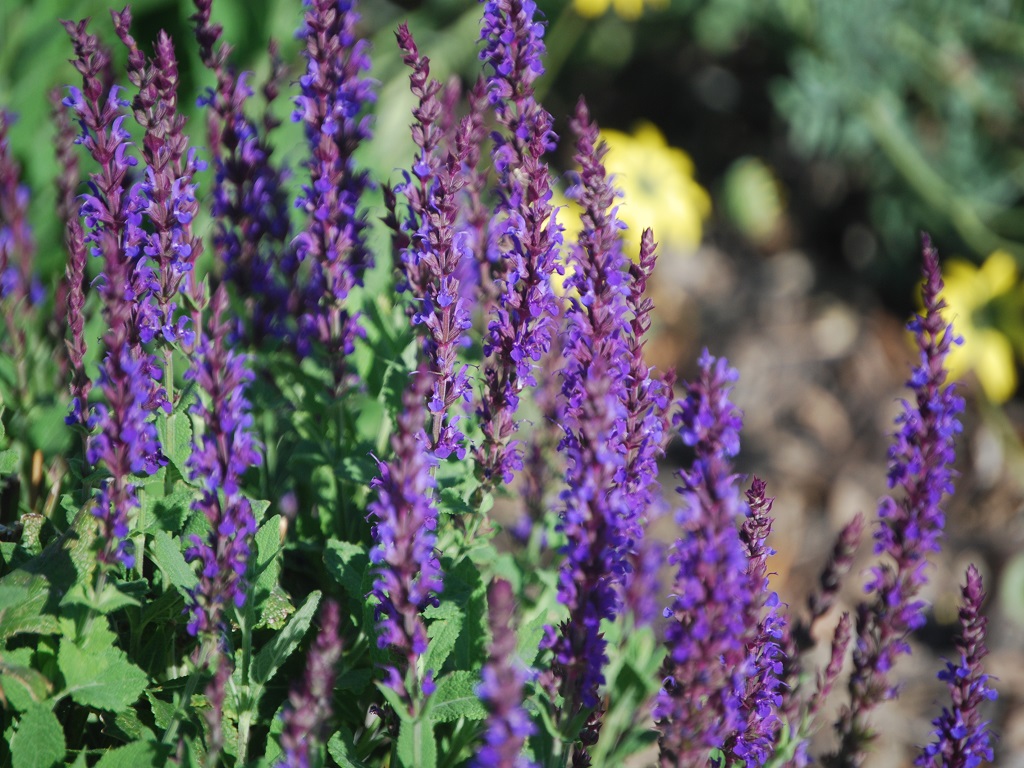
East Friesland Sage Salvia nemorosa 'Ostfriesland'
An upright-growing, clump-forming perennial this sage has purple stems and long-blooming violet flowers. Prompt deadheading will promote rebloom. Its dark green, wrinkled foliage grows on erect stems and is fragrant when bruised. Plant it in well-drained soil and do not overwater.
-
Eastern Redbud Cercis canadensis
This small tree is one of the most popular flowering landscape trees. Often multi-stemmed or low-branching, with a beautiful open shape. Spring brings magenta buds followed by abundant clusters of rosy-pink flowers. The beautiful heart-shaped leaves are bronze to purple when new, turning a dull green to bluish green in the summer, and finally yellow in the fall. Adaptable to many soil types. Moderately drought tolerant.
-
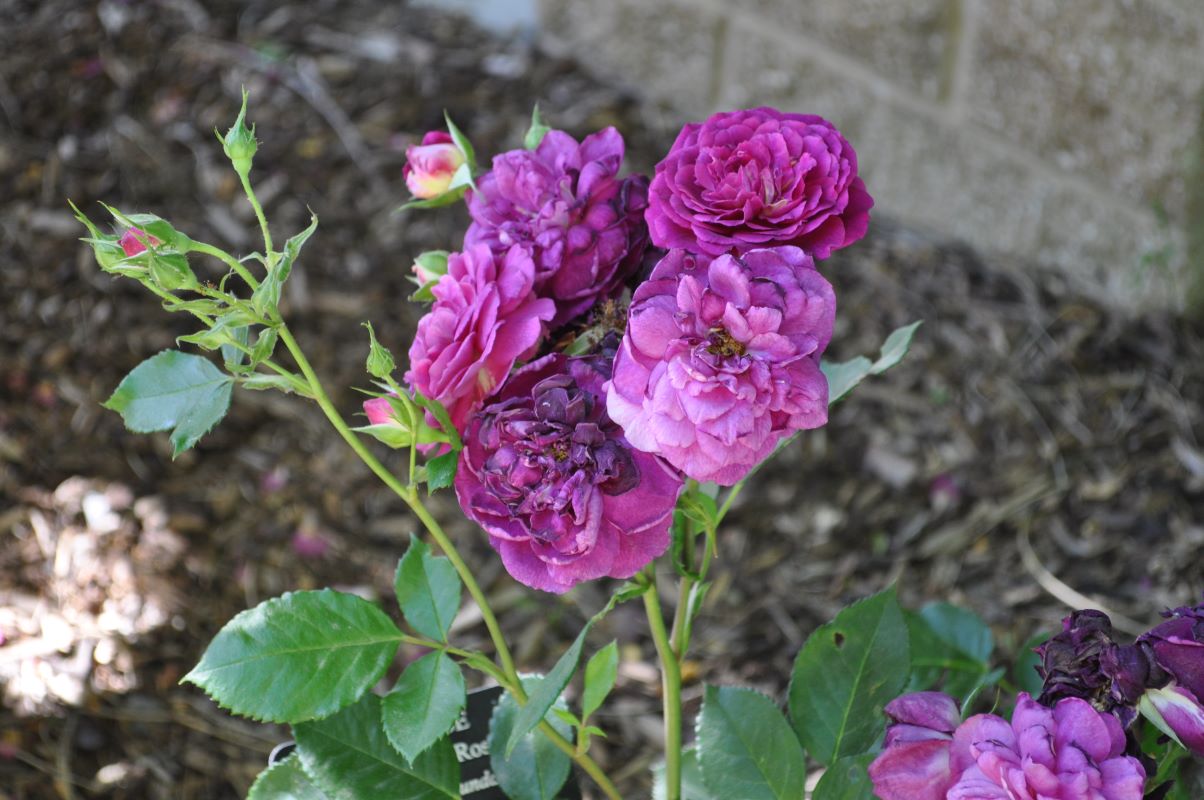
Ebb Tide Floribunda Rose Rosa floribunda 'WEKsmopur'
This rose is compact and rounded in habit. It has medium to dark green leaves that are semi-glossy. The flowers are deep purple and very fragrant. It has full flowers, about 3-4 inches in diameter, which will bloom repeatedly throughout the season. This rose likes well drained soil, and does not like its roots wet all the time.
-
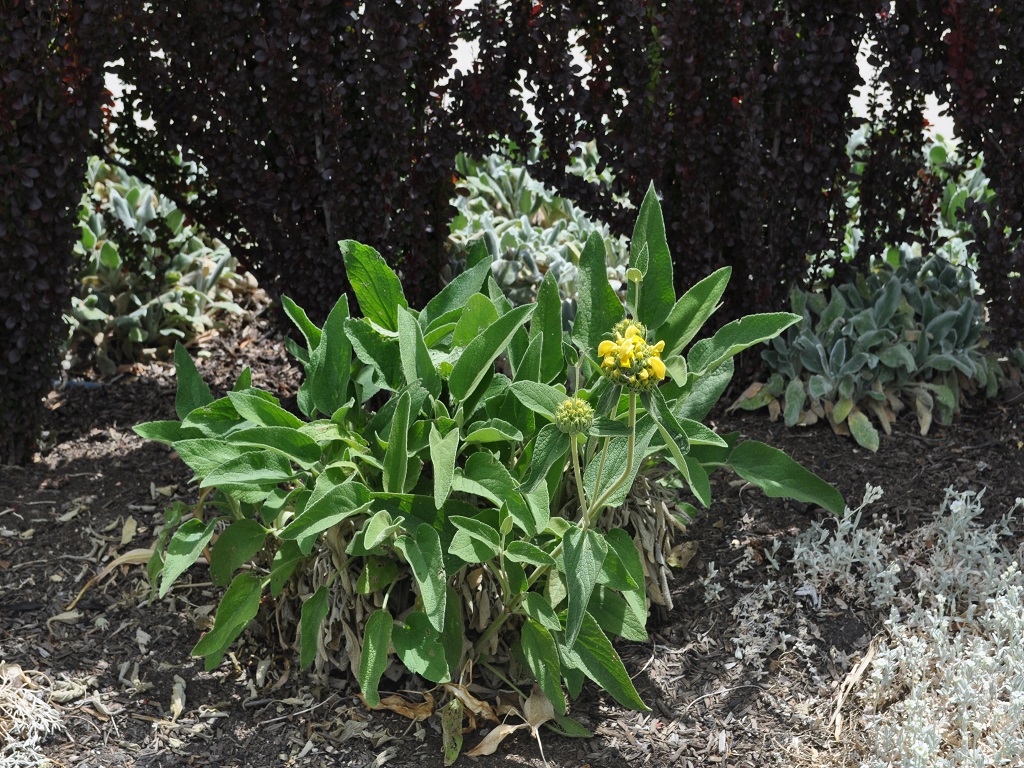
Edward Bowles Jerusalem Sage Phlomis 'Edward Bowles'
A shrubby perennial covered in sage-like gray-green leaves with woolly undersides. This is a hybrid of P. fruticosa x P. russeliana. Bears golden-yellow flowers in whorls during the summer months. Maintain the mounding form by cutting back to half its size in the fall. Prefers coastal areas and more temperate climates. May require some shelter in this area.
-
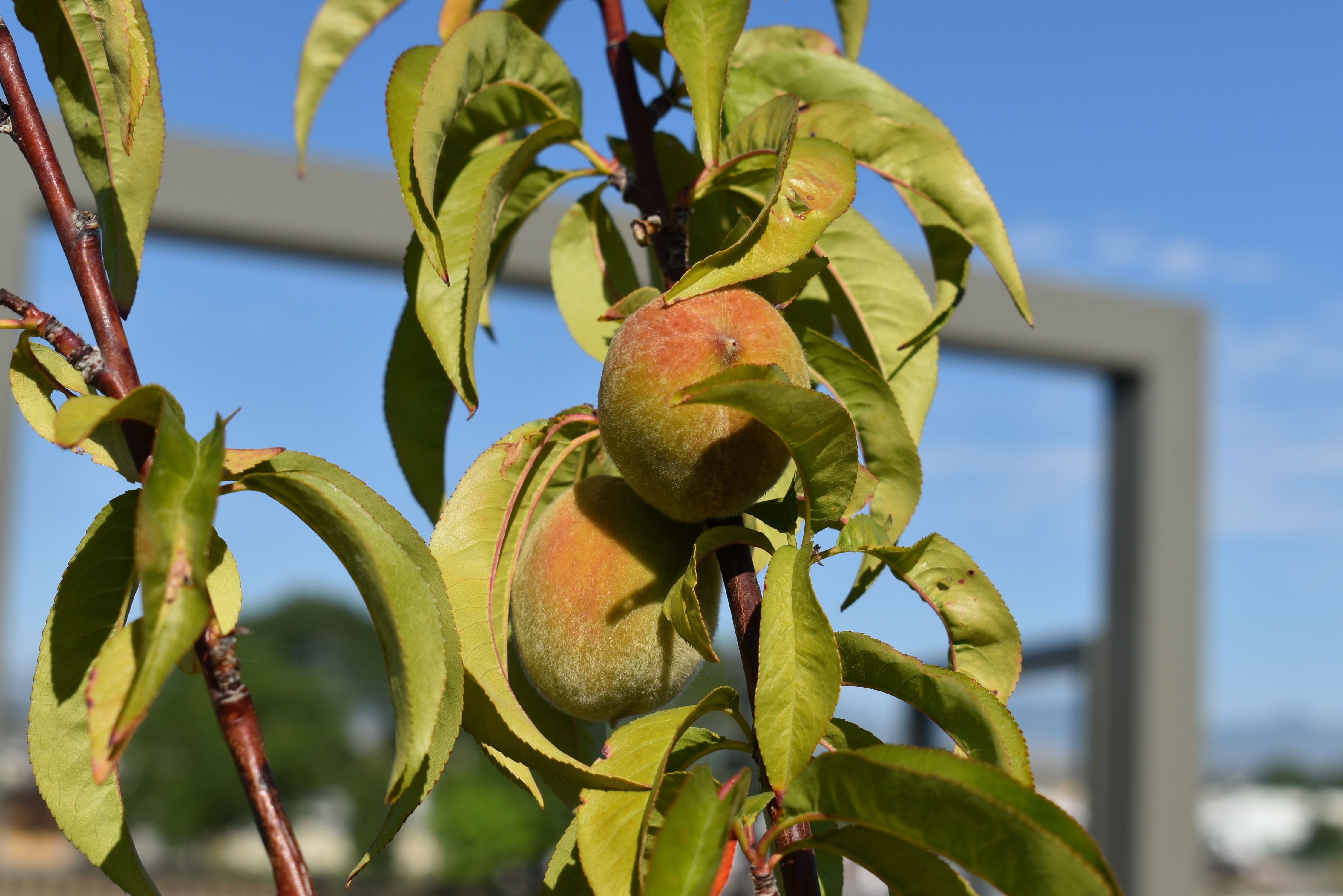
Elberta Dwarf Peach Prunus persica 'Elberta'
One of the most common of the peach varieties, the Elberta peach produces large crops of fuzzy yellow fruit with red blushed skin. The pit of this peach is freestone. The tree doesn't require a pollinator to produce fruit, but will have more fruit in the presence of another tree. Dark pink flowers are abundant in the early spring and fall turns the lance-shaped leaves yellow before they drop. Proper thinning and pest control will keep the tree healthy and producing for many years.
-
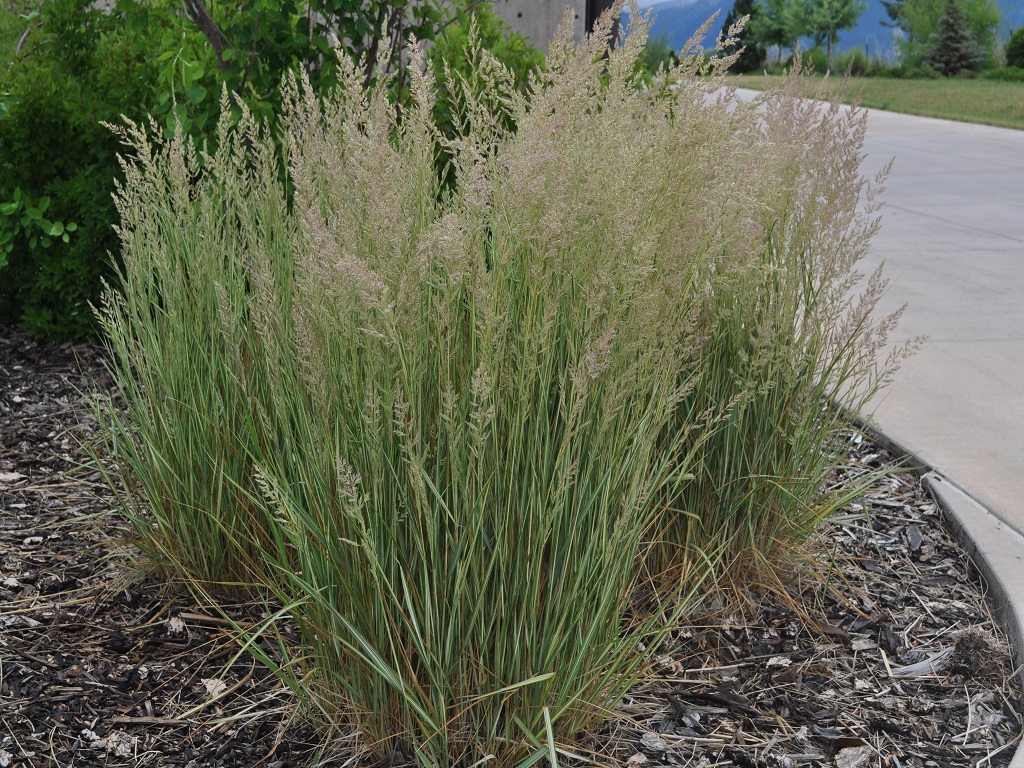
Eldorado Feather Reed Grass Calamagrostis x acutiflora 'Eldorado'
A variation of 'Karl Foerster' feather reed grass, this variety is almost identical in shape, but 'Eldorado' has golden-yellow midribs. It's seed heads have a golden yellow hue. It grows upright in stiff clumps that keep their shape through the year. They grow only to 5 or 6 feet tall, making them one of the most manageable ornamental grasses for the home landscape.
-
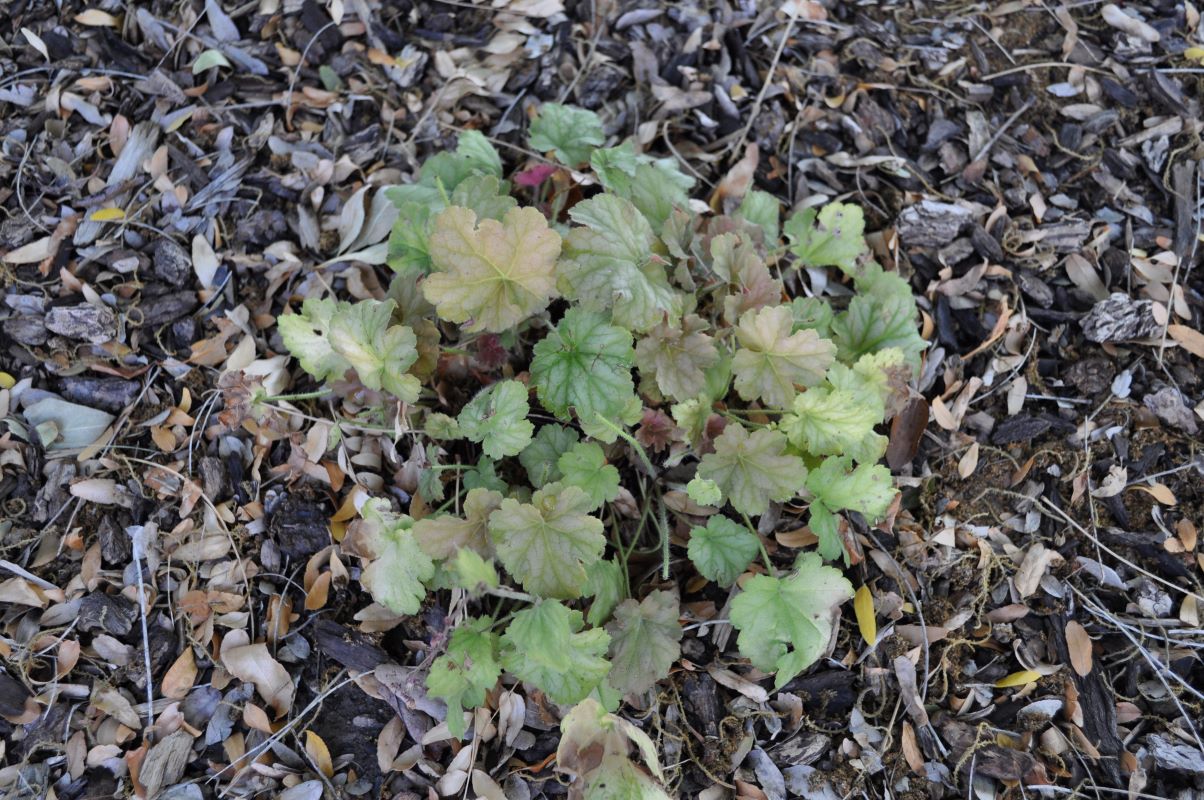
Electric Lime Coral Bells Heuchera 'Electric Lime'
This perennial forms clumps of lobed, semi-evergreen leaves that are a striking golden-green. Small white flowers bloom in late-spring to early-summer on tall, airy stems. It prefers organic soils with moderate amounts of moisture. Too much drought and heat can cause the foliage to decline through the summer.
-
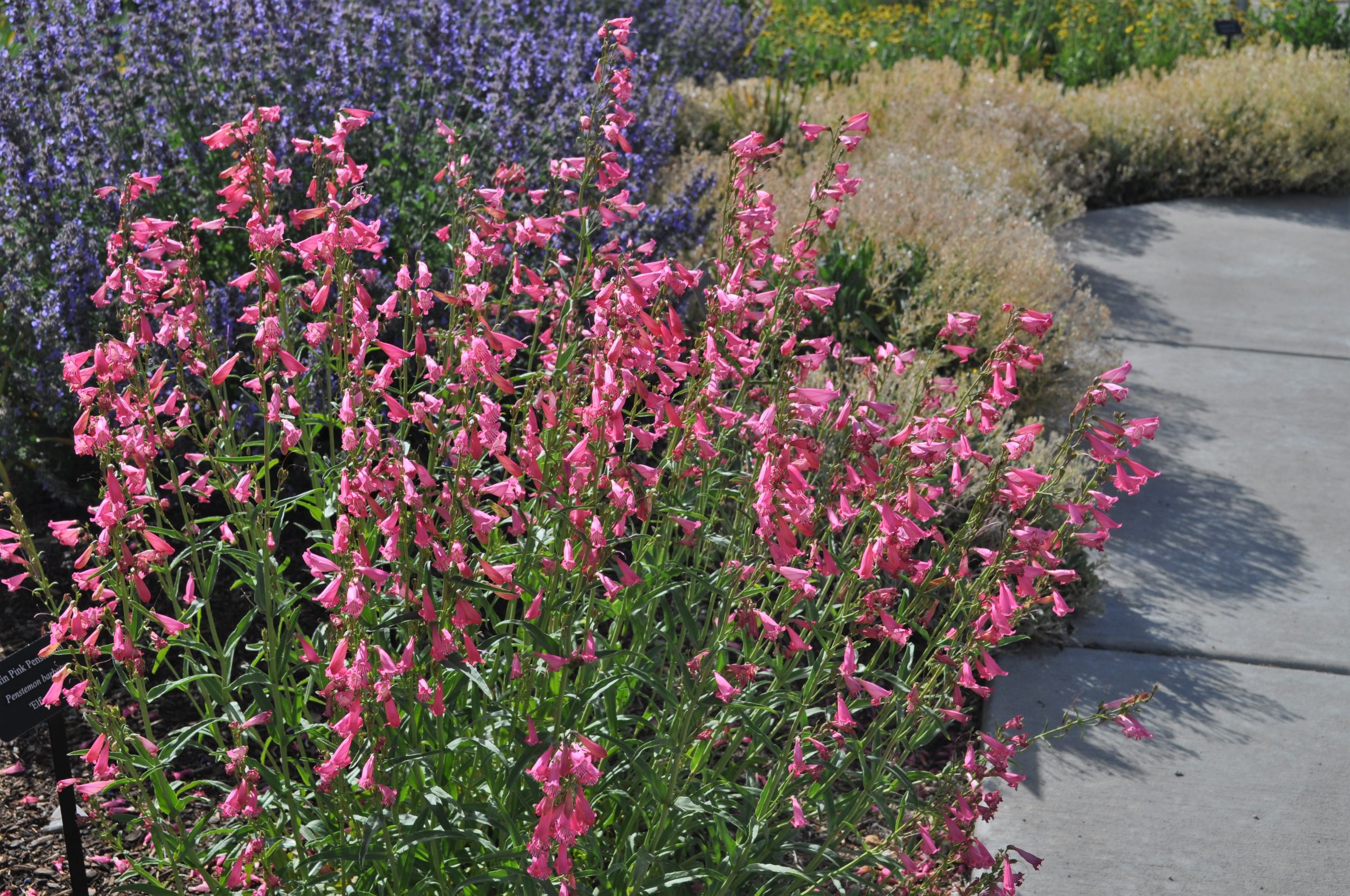
Elfin Pink Penstemon Penstemon barbatus 'Elfin Pink'
A small clump forming perennial cultivar adapted to heat and drought conditions. Basal rosettes of lance-shaped leaves are semi-evergreen. Bears pink blossoms on tall spikes. Regular dead-heading will promote longer blooming. Prefers well-drained soil and will bloom longer with regular watering.
-
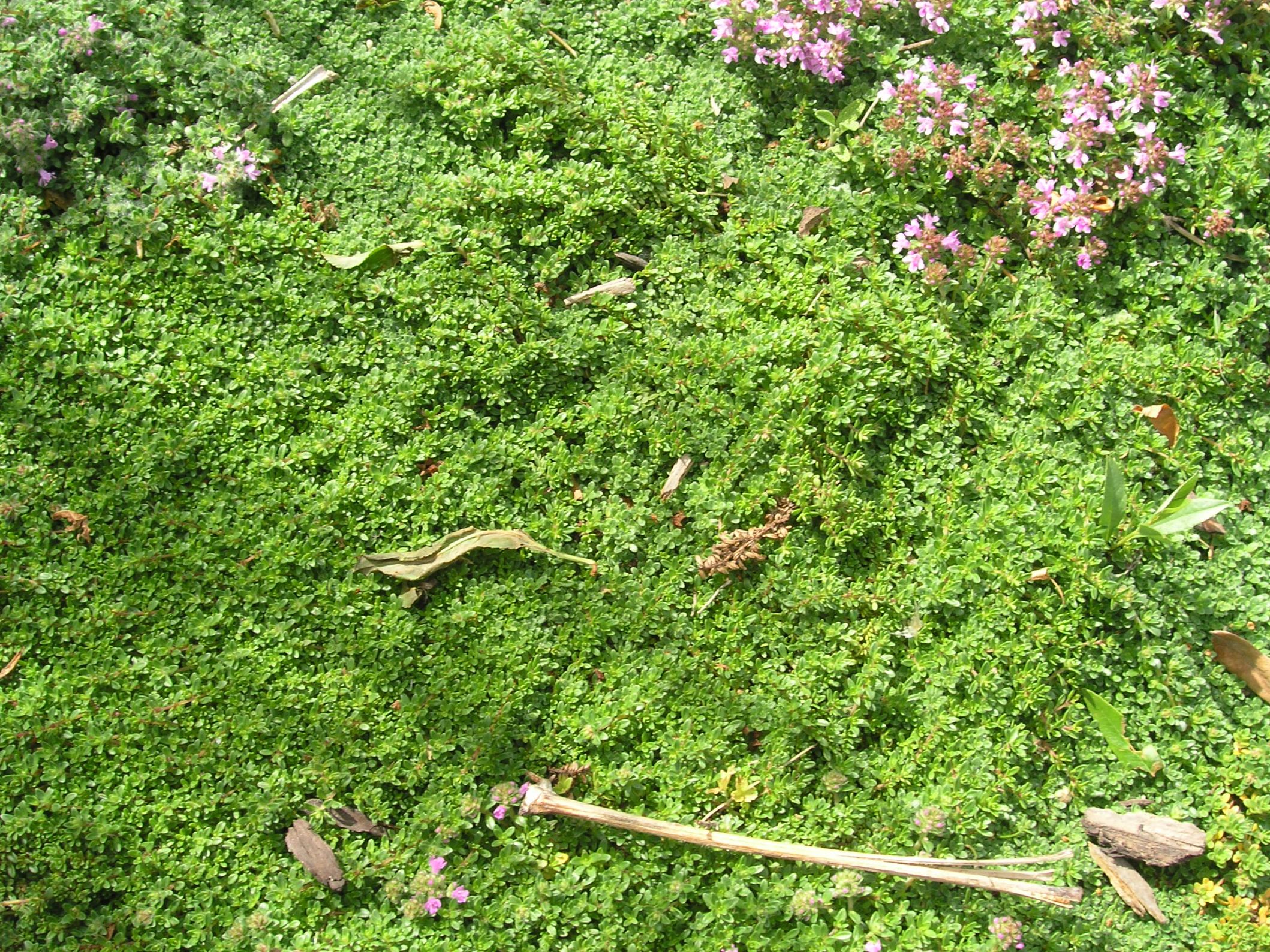
Elfin Thyme Thymus serpyllum 'Elfin'
Very low-growing groundcover that forms a dense mat of semi-evergeen foliage. Although seldom seen, lavender-pink flowers sometimes appear in mid to late-spring. Grows best in well drained soil in full sun. Suitable for planting in paving crevices, walkways and rock gardens. Will tolerates some traffic.
-
Elijah Blue Fescue Festuca glauca 'Elijah Blue'
The bluest of the blue fescues. This is a densely tufted, evergreen perennial grass with upright, silvery blue-green leaves. Bears wheat-golden seedheads in May through June. Extremely drought and heat tolerant.
-
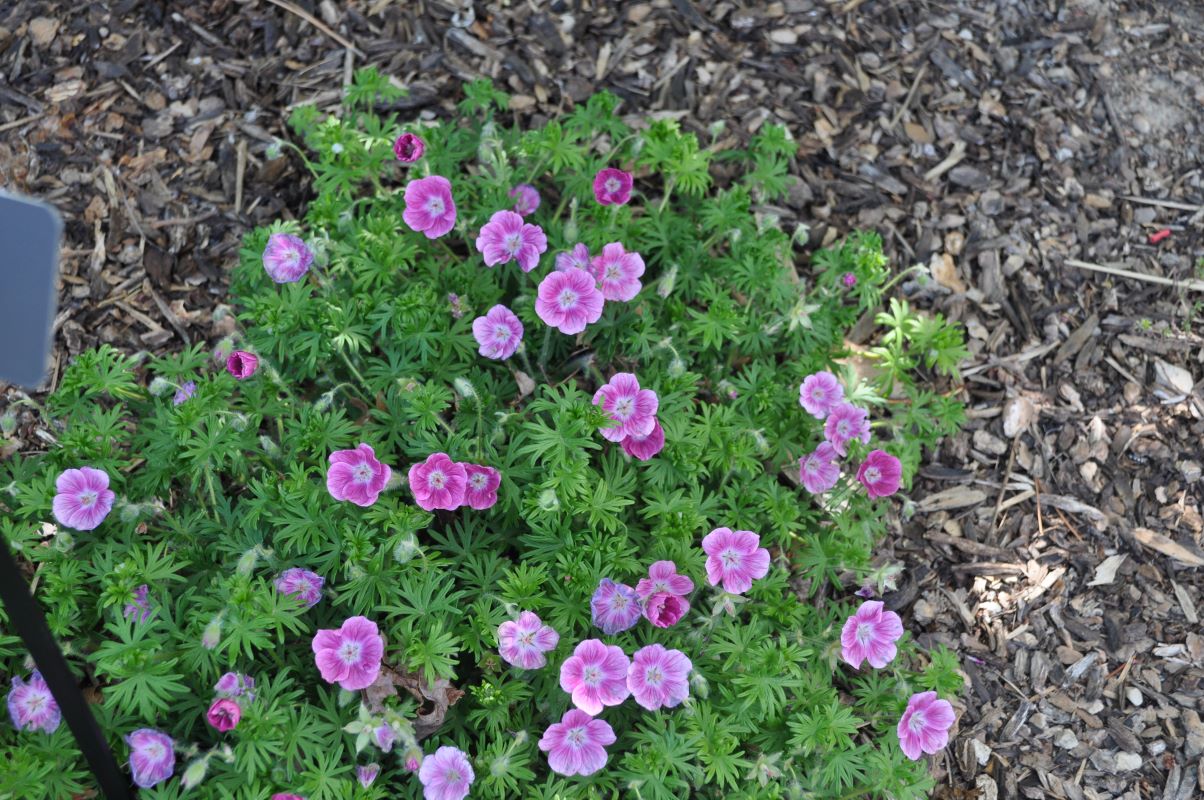
Elke Cranesbill Geranium sanguineum 'Elke'
A low-growing perennial, this hardy geranium has glossy, dark-green leaves. Vibrant pink flowers grow vigorously in the spring and sport bright red veins and white edges. Grows best in well-drained soils and requires very little maintenance.
-
Ember Waves Western Arborvitae Thuja 'Monpin'
Great evergreen tree used for a screen, windbreak or specimen planting. Golden yellow growth contrasts the mature chartreuse bright green foliage. Deep gold, orange colors arise with the cooling weather in the fall.
-
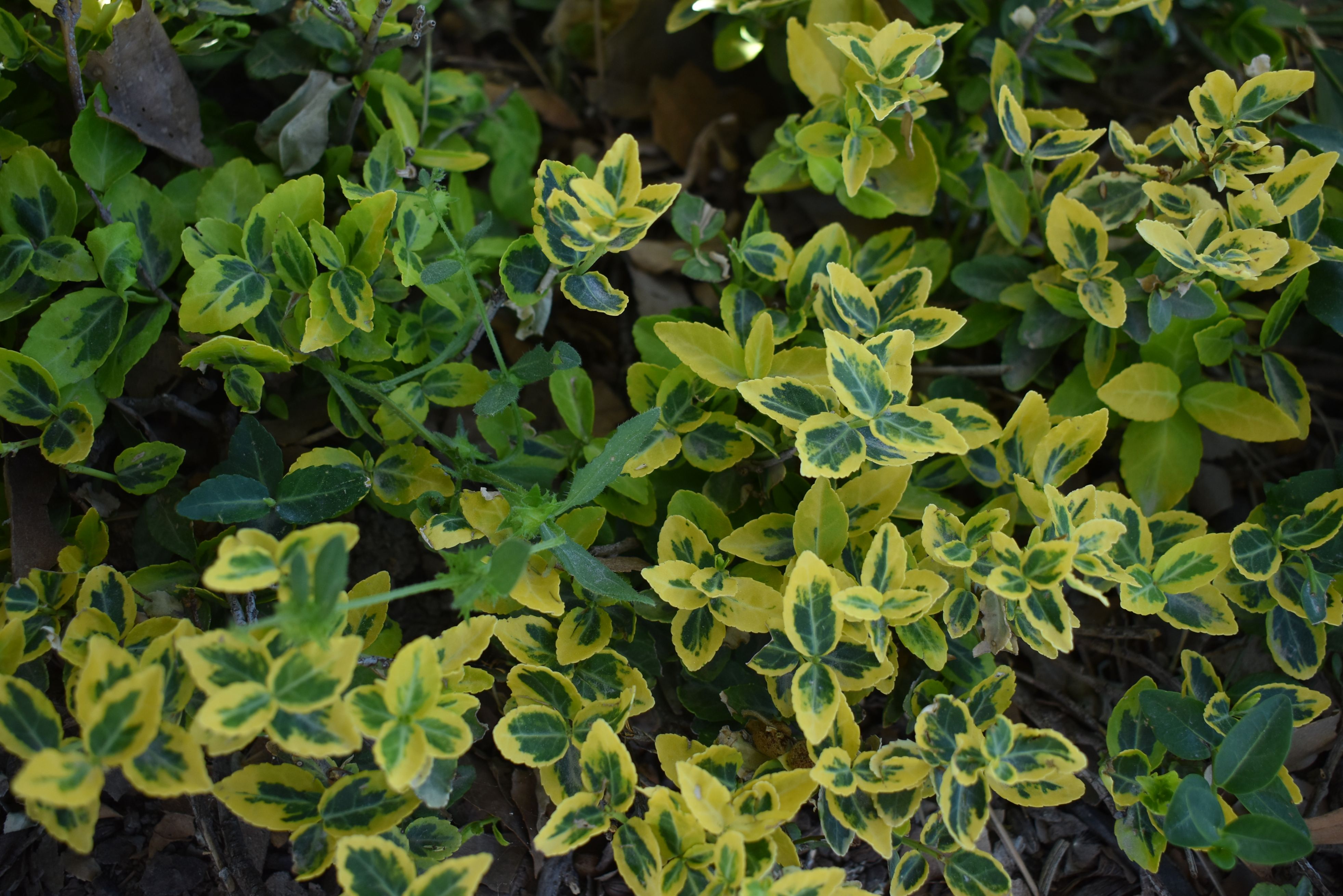
Emerald 'n' Gold Wintercreeper Euonymus fortunei 'Emerald 'n' Gold'
Low-growing, spreading broadleaf evergreen shrub. Bears bright green leaves with bright yellow margins turning pinkish in winter. Inconspicuous greenish-white flowers appear in June. Spreads along the ground, re-rooting as it goes, and will climb walls if given support. Tolerates a wide range of soils and conditions except for overwatering.
-
Emerald Blue Phlox Phlox subulata 'Emerald Blue'
Dense, low-growing branches form mats of semi-evergreen, bright green, linear foliage. Late-spring to early-summer brings profuse light blue five-petaled flowers with notched petals. Suitable for rock gardens. Tolerant of drought. Plant in well-drained soils.
-
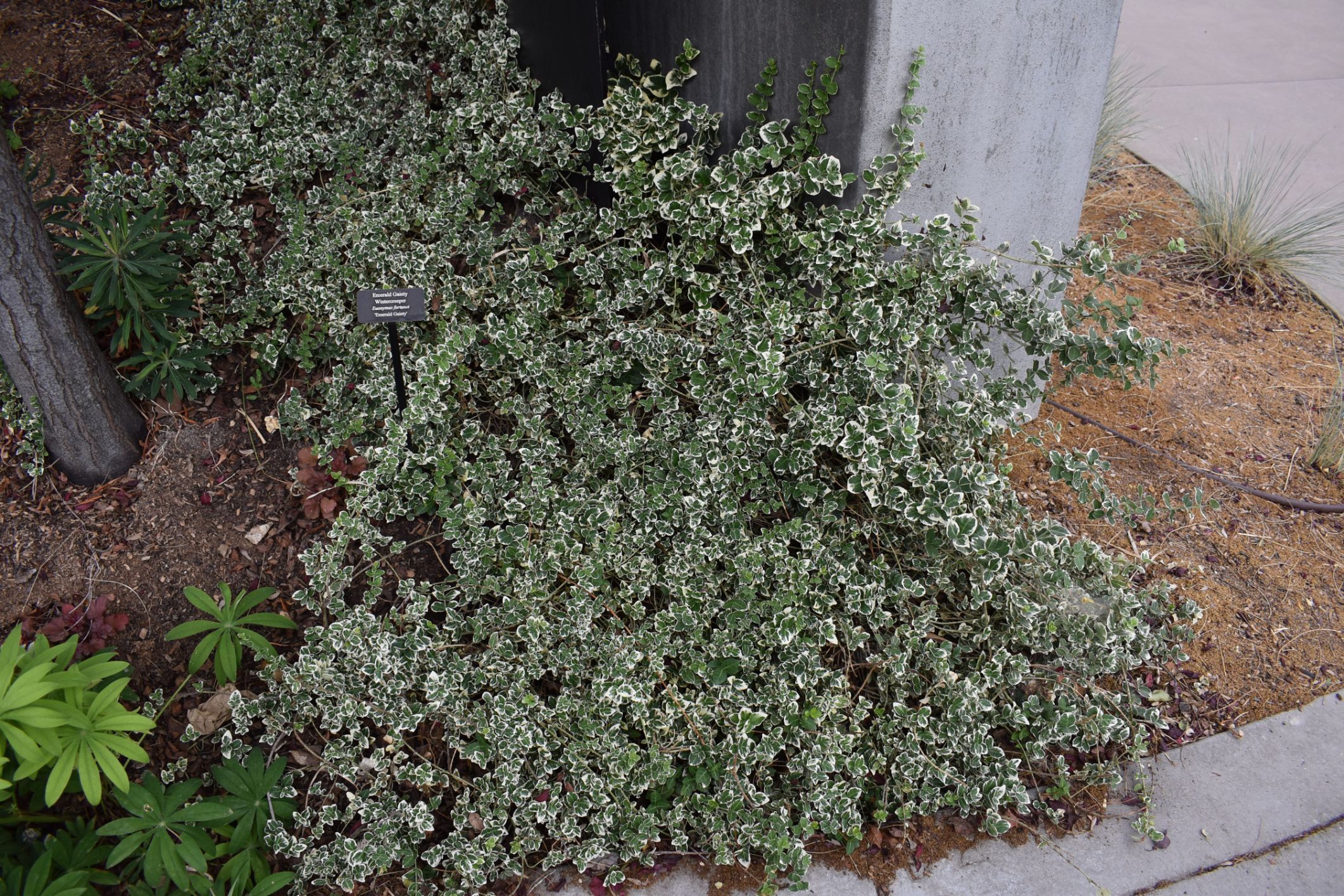
Emerald Gaiety Wintercreeper Euonymus fortunei 'Emerald Gaiety'
Compact broad-leafed evergreen. Bears bright green leaves with creamy white margins tinged pink in the winter. Inconspicous flowers are greenish-white and sparse. Can be trained to climb with some effort. Adaptable to many soil types and situations. Will not tolerate overwatering.
-
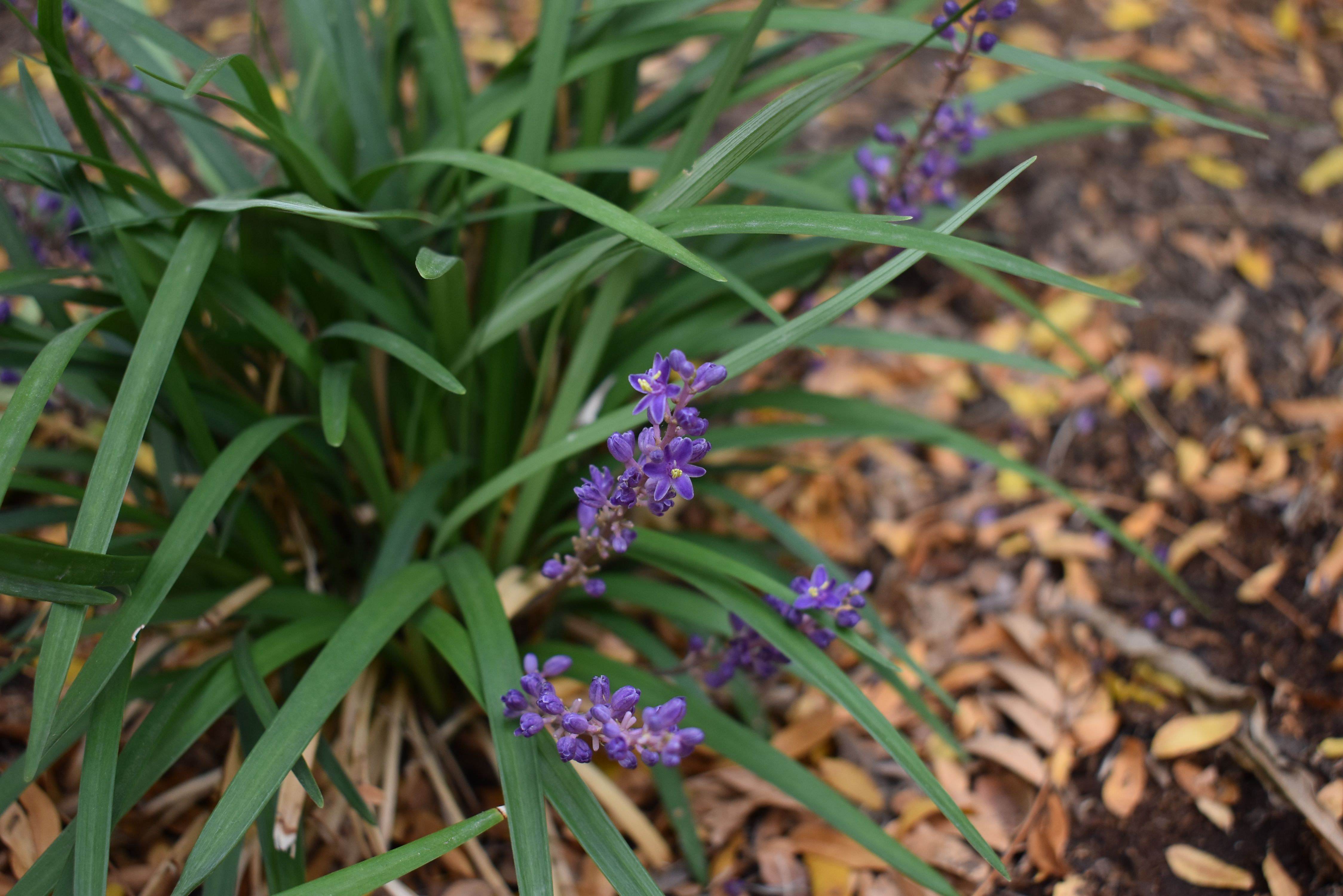
Emerald Goddess Lilyturf Liriope muscari 'Love Potion No. 13'
This purple-flowering perennial is both drought and cold tolerant. The grass-like foliage will give you a beautiful, sleek green color throughout the winter months. Later, the striking purple flowers provide long-lasting color in late summer. Use in mass plantings to bring low-maintenance winter interest and summer color to borders and slopes.
-
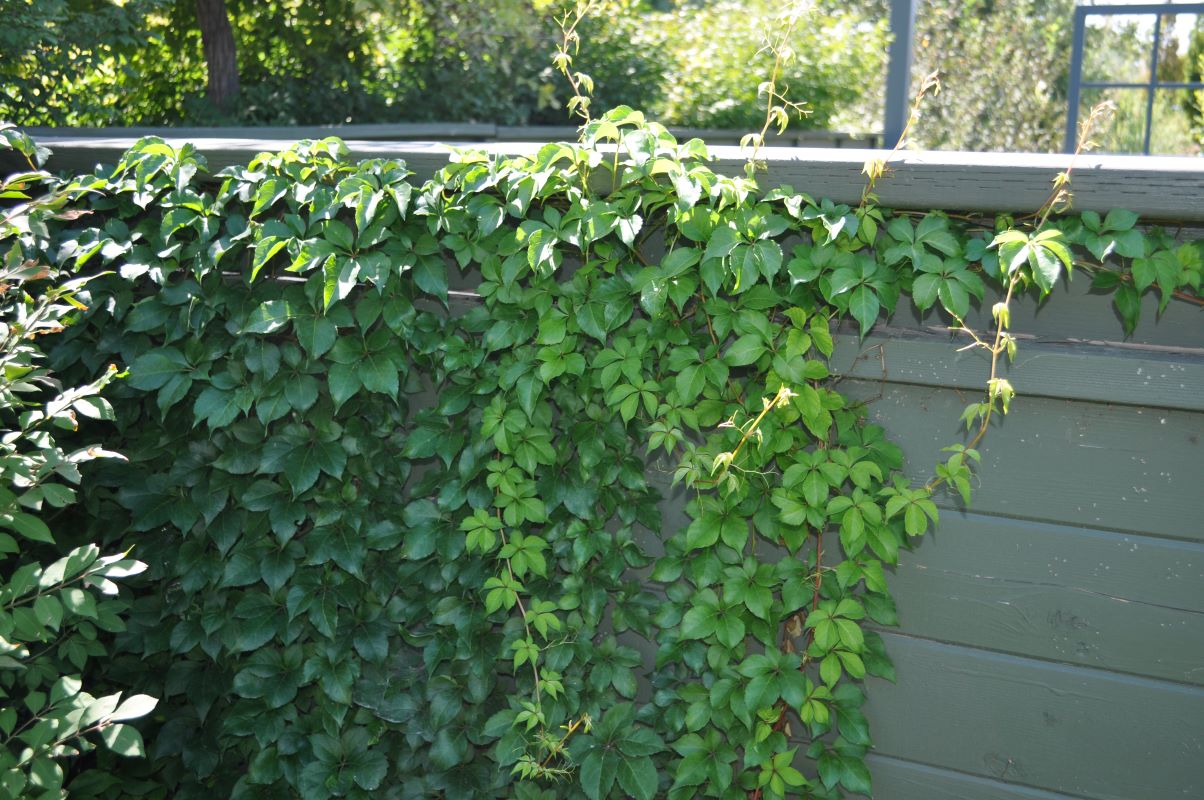
Engelman's Virginia Creeper Parthenocissus quinquefolia var. engelmannii
Aggressive climbing vine with dark-green palmate leaves composed of five leaflets with serrated edges. Produces clusters of inconspicuous flowers that turn to hard dark-purple to black berries. The berries contain oxalic acid which is poisonous to humans but they are so bitter that there is little threat of ingesting enough to be harmful. Take care to plant in a site where it will have room to spread. May produce a show of bright red foliage in the fall.
-
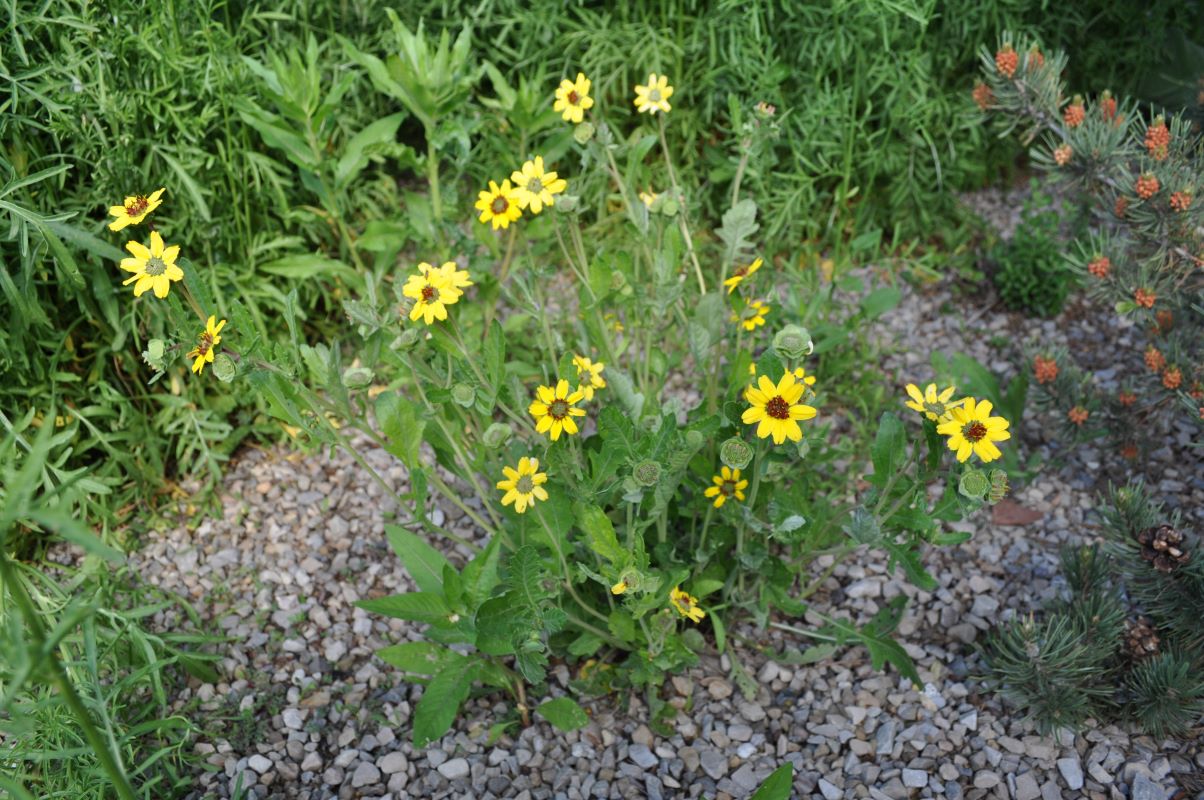
Engelmann's Daisy Engelmannia peristenia
This perennial offers adorable bright yellow flowers that will bloom for you all summer long. It is a great plant to grow when conditions are not ideal and when care is going to be minimal. When this plant is particularly happy it will reseed itself and grow naturally. It does not grow well in areas with lots of water or deep shade.
-
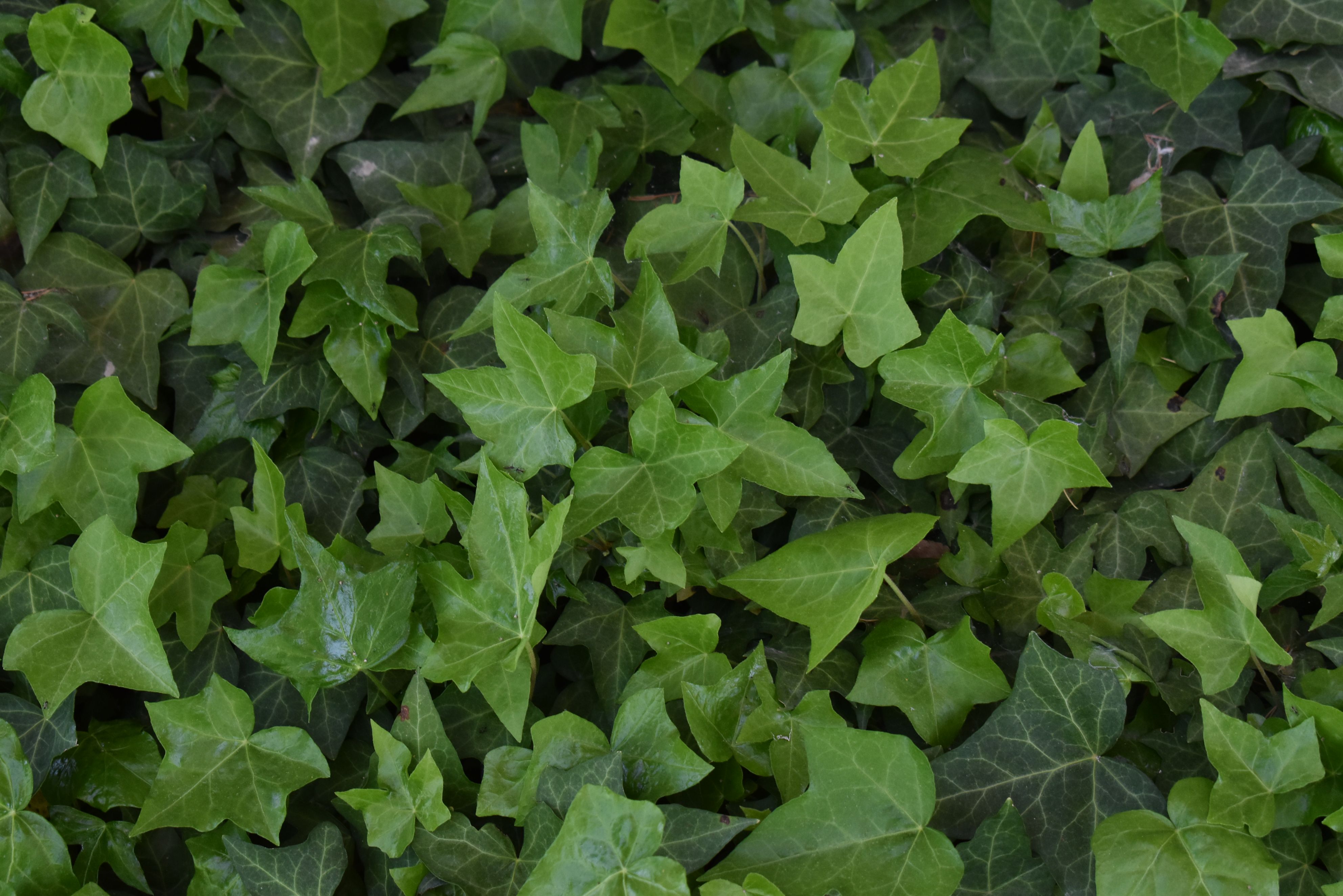
English Ivy Hedera helix
Evergreen woody vine that will climb almost any object. As a groundcover, it will only reach 3-6" but will grow taller as a climbing vine. Heart-shaped dark green leaves provide its primary appeal. Many different cultivars are available. Needs to grow in shade and have regular amounts of water.
-
English Lavender Lavandula angustifolia
Great multi-use plant used as an herb for its soothing fragrance and as a water-wise landscape plant. A compact, bushy shrub with semi-evergreen gray-green leaves and a pretty Mediterranean look. The fragrant, deep purple to blue blossoms form on long stalks up to 3 inches long, in late spring to early summer. These can be harvested in their bud stage and dried for indoor use. Prefers full sun but can handle some shade.
-
English Oak Quercus robur
Large, stately deciduous tree. Tolerant of drought and many soil types. Requires little pruning due to excellent branch development. Dark-green, lobed leaves turn brown in the fall and may stay on the tree through the winter. Best used in drier climates due to its susceptibility to powdery mildew. Produces acorns which can become messy. Robur in the name references its strength and the hardness of the wood. Acorns are edible but may require some processing before eating due to high levels of tannin that cause a bitter taste.
-
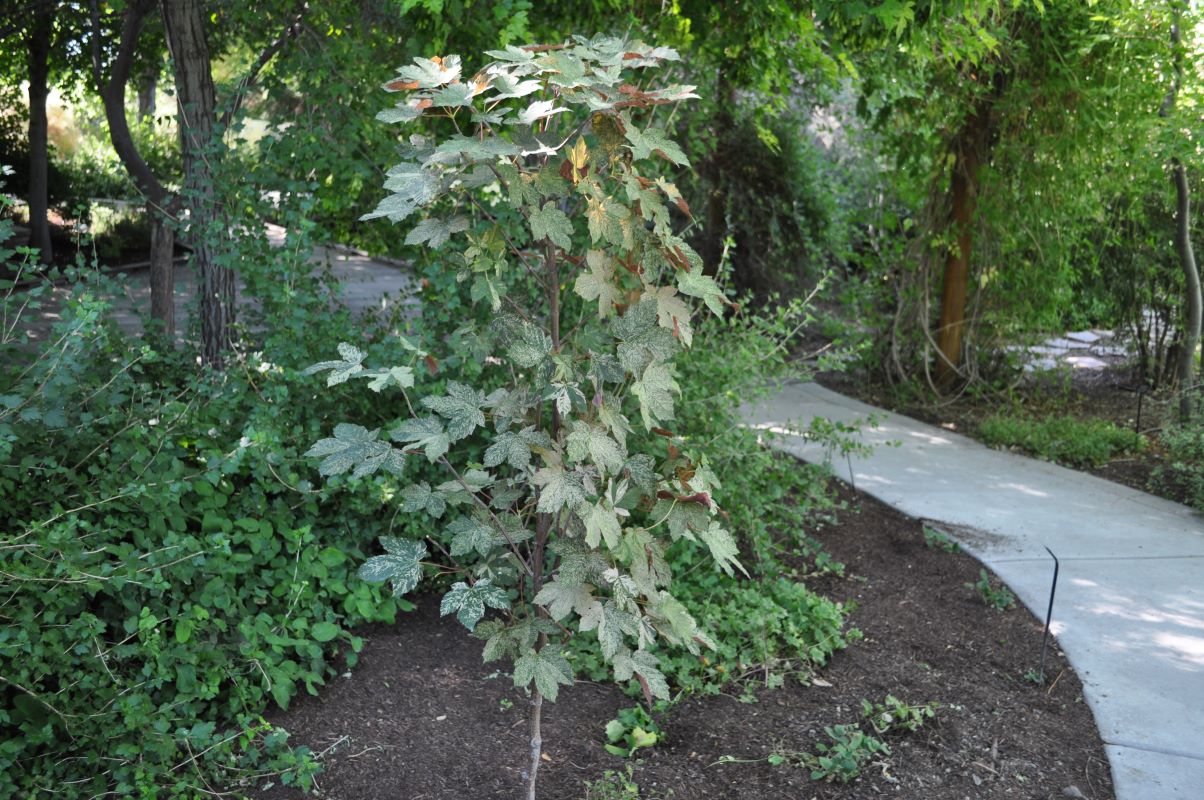
Eskimo Sunset Sycamore Maple Acer pseudoplatanus 'Esk Sunset'
A small sized deciduous tree. Striking foliage emerges in the spring orange-pink, then matures to deep green with streaks of cream, tan and pink, with deep purple undersides.
-
Etched Glass Hosta Hosta 'Etched Glass'
An eye-catching hosta with wide, dark-green margins and bright yellow centers. The thick leaves are puckered and arranged in a dense mound when mature. Tall stalks of fragrant white flowers emerge in late summer. Ever-versatile hostas are a popular choice for shady borders.
-
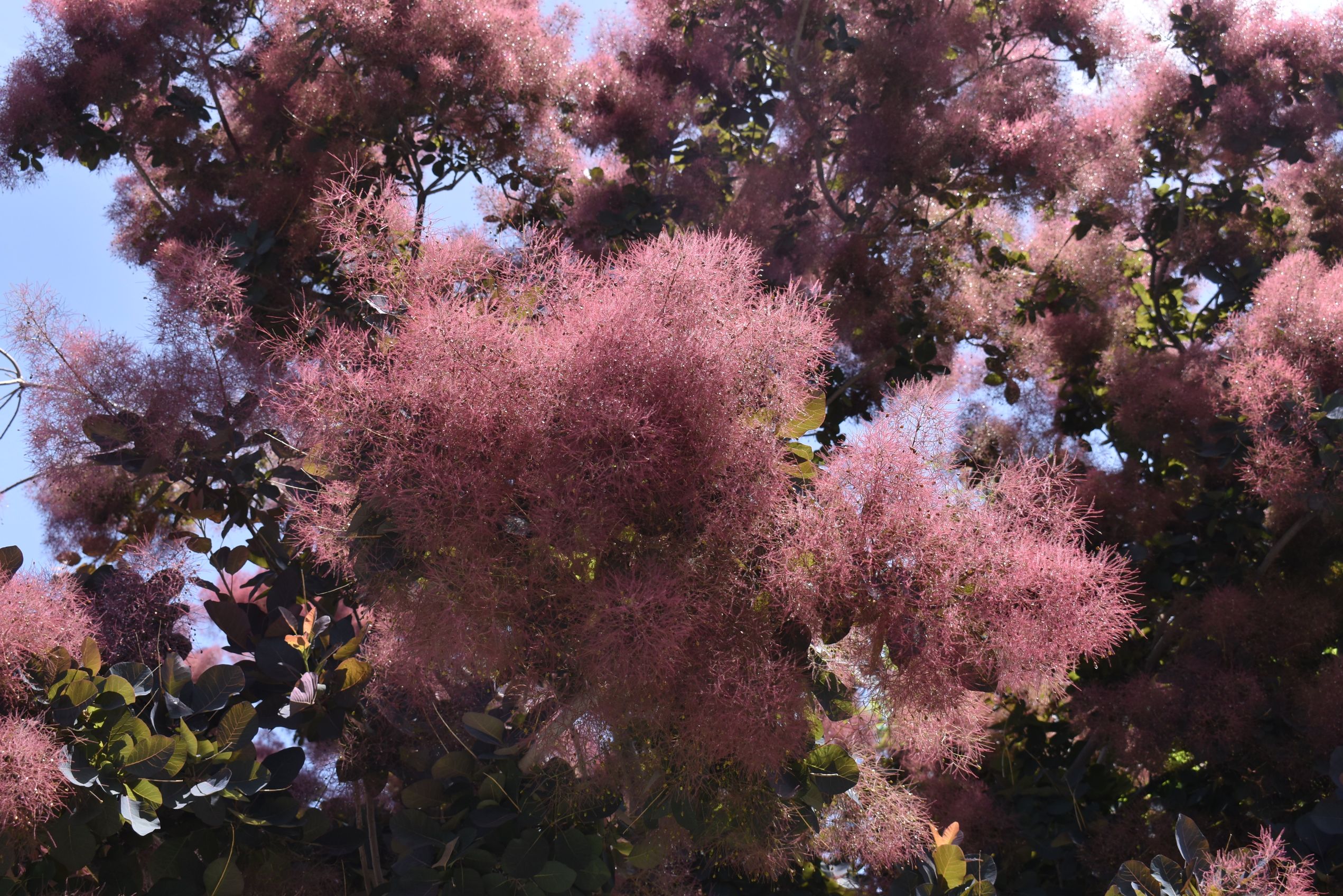
European Smoketree Cotinus coggygria
The round leaves of this small deciduous tree (or large shrub) emerge a dark purple but fade to bluish-green as the year progresses. Fall brings shades of purples and reds. Purple and pink clouds of smoke-like seed heads emerge in the spring. It can get big and grows with multiple stems. Make sure to give it plenty room to grow. Several purple-leaved cultivars exist which retain the coloring through the summer.
-
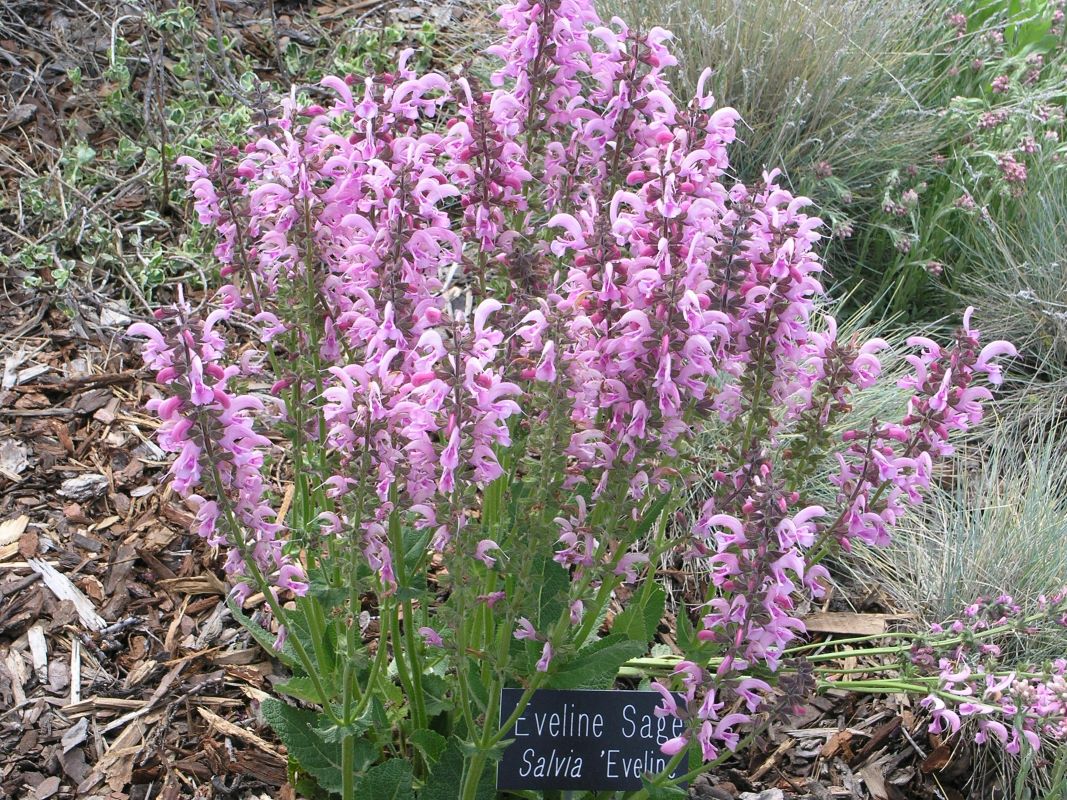
Eveline Sage Salvia 'Eveline'
Flowering perennial with upright stems bearing spikes of two-toned flowers. Blossoms are light-pink with purple bases and appear in late-spring to early-summer. Leaves are dark to mid-green and grow basally.
-
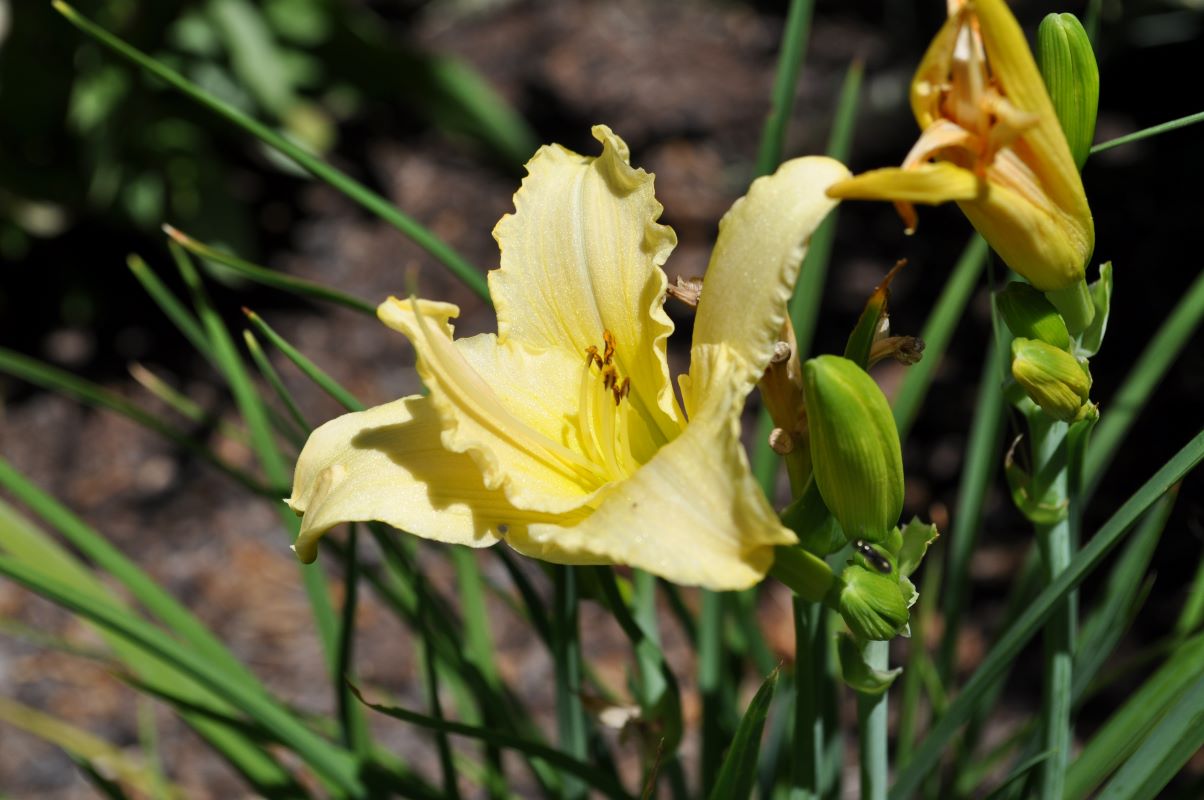
EveryDaylily Cream Daylily Hemerocallis 'VER00112'
This daylily is smaller in size, hardy and reblooming. It has beautiful creamy yellow petals with ruffled edges. Planting this perennial will provide a mass of continuous color from summer until fall in your containers, beds, and borders.
-

Early Hybrids Red-Hot Poker
Upright growing perennial. Narrow grass-like leaves grow basally. Flowers are in shades of red and orange turning to yellow at the base. Very drought and heat tolerant. Deadheading will prolong bloom time. Plant in well-drained soils.
Kniphofia uvaria 'Early Hybrids'
Mature Size: 3-4' tall x 1-2' wide
-

East Friesland Sage
An upright-growing, clump-forming perennial this sage has purple stems and long-blooming violet flowers. Prompt deadheading will promote rebloom. Its dark green, wrinkled foliage grows on erect stems and is fragrant when bruised. Plant it in well-drained soil and do not overwater.
Salvia nemorosa 'Ostfriesland'
Mature Size: 12-18" tall x 8-12" wide
-
Eastern Redbud
This small tree is one of the most popular flowering landscape trees. Often multi-stemmed or low-branching, with a beautiful open shape. Spring brings magenta buds followed by abundant clusters of rosy-pink flowers. The beautiful heart-shaped leaves are bronze to purple when new, turning a dull green to bluish green in the summer, and finally yellow in the fall. Adaptable to many soil types. Moderately drought tolerant.
Cercis canadensis
Mature Size: 30' tall and wide
-

Ebb Tide Floribunda Rose
This rose is compact and rounded in habit. It has medium to dark green leaves that are semi-glossy. The flowers are deep purple and very fragrant. It has full flowers, about 3-4 inches in diameter, which will bloom repeatedly throughout the season. This rose likes well drained soil, and does not like its roots wet all the time.
Rosa floribunda 'WEKsmopur'
Mature Size: 4-5' tall and 3-4' wide
-

Edward Bowles Jerusalem Sage
A shrubby perennial covered in sage-like gray-green leaves with woolly undersides. This is a hybrid of P. fruticosa x P. russeliana. Bears golden-yellow flowers in whorls during the summer months. Maintain the mounding form by cutting back to half its size in the fall. Prefers coastal areas and more temperate climates. May require some shelter in this area.
Phlomis 'Edward Bowles'
Mature Size: 3-4' tall x 3' wide
-

Elberta Dwarf Peach
One of the most common of the peach varieties, the Elberta peach produces large crops of fuzzy yellow fruit with red blushed skin. The pit of this peach is freestone. The tree doesn't require a pollinator to produce fruit, but will have more fruit in the presence of another tree. Dark pink flowers are abundant in the early spring and fall turns the lance-shaped leaves yellow before they drop. Proper thinning and pest control will keep the tree healthy and producing for many years.
Prunus persica 'Elberta'
Mature Size: 12-15' tall and wide
-

Eldorado Feather Reed Grass
A variation of 'Karl Foerster' feather reed grass, this variety is almost identical in shape, but 'Eldorado' has golden-yellow midribs. It's seed heads have a golden yellow hue. It grows upright in stiff clumps that keep their shape through the year. They grow only to 5 or 6 feet tall, making them one of the most manageable ornamental grasses for the home landscape.
Calamagrostis x acutiflora 'Eldorado'
Mature Size: 6' tall x 2' wide
-

Electric Lime Coral Bells
This perennial forms clumps of lobed, semi-evergreen leaves that are a striking golden-green. Small white flowers bloom in late-spring to early-summer on tall, airy stems. It prefers organic soils with moderate amounts of moisture. Too much drought and heat can cause the foliage to decline through the summer.
Heuchera 'Electric Lime'
Mature Size: 16-18" tall x 12-16" wide
-

Elfin Pink Penstemon
A small clump forming perennial cultivar adapted to heat and drought conditions. Basal rosettes of lance-shaped leaves are semi-evergreen. Bears pink blossoms on tall spikes. Regular dead-heading will promote longer blooming. Prefers well-drained soil and will bloom longer with regular watering.
Penstemon barbatus 'Elfin Pink'
Mature Size: 24" tall x 15" wide
-

Elfin Thyme
Very low-growing groundcover that forms a dense mat of semi-evergeen foliage. Although seldom seen, lavender-pink flowers sometimes appear in mid to late-spring. Grows best in well drained soil in full sun. Suitable for planting in paving crevices, walkways and rock gardens. Will tolerates some traffic.
Thymus serpyllum 'Elfin'
Mature Size: 1-3" tall x 8-12" wide
-
Elijah Blue Fescue
The bluest of the blue fescues. This is a densely tufted, evergreen perennial grass with upright, silvery blue-green leaves. Bears wheat-golden seedheads in May through June. Extremely drought and heat tolerant.
Festuca glauca 'Elijah Blue'
Mature Size: 12" tall x 10" wide
-

Elke Cranesbill
A low-growing perennial, this hardy geranium has glossy, dark-green leaves. Vibrant pink flowers grow vigorously in the spring and sport bright red veins and white edges. Grows best in well-drained soils and requires very little maintenance.
Geranium sanguineum 'Elke'
Mature Size: 9" tall x 12" wide
-
Ember Waves Western Arborvitae
Great evergreen tree used for a screen, windbreak or specimen planting. Golden yellow growth contrasts the mature chartreuse bright green foliage. Deep gold, orange colors arise with the cooling weather in the fall.
Thuja 'Monpin'
Mature Size: 25' tall x 8' wide
-

Emerald 'n' Gold Wintercreeper
Low-growing, spreading broadleaf evergreen shrub. Bears bright green leaves with bright yellow margins turning pinkish in winter. Inconspicuous greenish-white flowers appear in June. Spreads along the ground, re-rooting as it goes, and will climb walls if given support. Tolerates a wide range of soils and conditions except for overwatering.
Euonymus fortunei 'Emerald 'n' Gold'
Mature Size: 24" tall x 36" wide
-
Emerald Blue Phlox
Dense, low-growing branches form mats of semi-evergreen, bright green, linear foliage. Late-spring to early-summer brings profuse light blue five-petaled flowers with notched petals. Suitable for rock gardens. Tolerant of drought. Plant in well-drained soils.
Phlox subulata 'Emerald Blue'
Mature Size: 2-6" tall x 20" wide
-

Emerald Gaiety Wintercreeper
Compact broad-leafed evergreen. Bears bright green leaves with creamy white margins tinged pink in the winter. Inconspicous flowers are greenish-white and sparse. Can be trained to climb with some effort. Adaptable to many soil types and situations. Will not tolerate overwatering.
Euonymus fortunei 'Emerald Gaiety'
Mature Size: 3' tall x 5' wide
-

Emerald Goddess Lilyturf
This purple-flowering perennial is both drought and cold tolerant. The grass-like foliage will give you a beautiful, sleek green color throughout the winter months. Later, the striking purple flowers provide long-lasting color in late summer. Use in mass plantings to bring low-maintenance winter interest and summer color to borders and slopes.
Liriope muscari 'Love Potion No. 13'
Mature Size: 18-24" tall x 30" wide
-

Engelman's Virginia Creeper
Aggressive climbing vine with dark-green palmate leaves composed of five leaflets with serrated edges. Produces clusters of inconspicuous flowers that turn to hard dark-purple to black berries. The berries contain oxalic acid which is poisonous to humans but they are so bitter that there is little threat of ingesting enough to be harmful. Take care to plant in a site where it will have room to spread. May produce a show of bright red foliage in the fall.
Parthenocissus quinquefolia var. engelmannii
Mature Size: 25-75' tall and wide
-

Engelmann's Daisy
This perennial offers adorable bright yellow flowers that will bloom for you all summer long. It is a great plant to grow when conditions are not ideal and when care is going to be minimal. When this plant is particularly happy it will reseed itself and grow naturally. It does not grow well in areas with lots of water or deep shade.
Engelmannia peristenia
Mature Size: 2' tall and wide
-

English Ivy
Evergreen woody vine that will climb almost any object. As a groundcover, it will only reach 3-6" but will grow taller as a climbing vine. Heart-shaped dark green leaves provide its primary appeal. Many different cultivars are available. Needs to grow in shade and have regular amounts of water.
Hedera helix
Mature Size: 20-80' tall x 3-50' wide
-
English Lavender
Great multi-use plant used as an herb for its soothing fragrance and as a water-wise landscape plant. A compact, bushy shrub with semi-evergreen gray-green leaves and a pretty Mediterranean look. The fragrant, deep purple to blue blossoms form on long stalks up to 3 inches long, in late spring to early summer. These can be harvested in their bud stage and dried for indoor use. Prefers full sun but can handle some shade.
Lavandula angustifolia
Mature Size: 2-3' tall x 3-4' wide
-
English Oak
Large, stately deciduous tree. Tolerant of drought and many soil types. Requires little pruning due to excellent branch development. Dark-green, lobed leaves turn brown in the fall and may stay on the tree through the winter. Best used in drier climates due to its susceptibility to powdery mildew. Produces acorns which can become messy. Robur in the name references its strength and the hardness of the wood. Acorns are edible but may require some processing before eating due to high levels of tannin that cause a bitter taste.
Quercus robur
Mature Size: 50-60' tall x 40-60' wide
-

Eskimo Sunset Sycamore Maple
A small sized deciduous tree. Striking foliage emerges in the spring orange-pink, then matures to deep green with streaks of cream, tan and pink, with deep purple undersides.
Acer pseudoplatanus 'Esk Sunset'
Mature Size: 12' tall x 10' wide
-
Etched Glass Hosta
An eye-catching hosta with wide, dark-green margins and bright yellow centers. The thick leaves are puckered and arranged in a dense mound when mature. Tall stalks of fragrant white flowers emerge in late summer. Ever-versatile hostas are a popular choice for shady borders.
Hosta 'Etched Glass'
Mature Size: 18" tall x 36" wide
-

European Smoketree
The round leaves of this small deciduous tree (or large shrub) emerge a dark purple but fade to bluish-green as the year progresses. Fall brings shades of purples and reds. Purple and pink clouds of smoke-like seed heads emerge in the spring. It can get big and grows with multiple stems. Make sure to give it plenty room to grow. Several purple-leaved cultivars exist which retain the coloring through the summer.
Cotinus coggygria
Mature Size: 10-15' tall and wide
-

Eveline Sage
Flowering perennial with upright stems bearing spikes of two-toned flowers. Blossoms are light-pink with purple bases and appear in late-spring to early-summer. Leaves are dark to mid-green and grow basally.
Salvia 'Eveline'
Mature Size: 24-30" tall x 12-18" wide
-

EveryDaylily Cream Daylily
This daylily is smaller in size, hardy and reblooming. It has beautiful creamy yellow petals with ruffled edges. Planting this perennial will provide a mass of continuous color from summer until fall in your containers, beds, and borders.
Hemerocallis 'VER00112'
Mature Size: 12-15" tall and wide